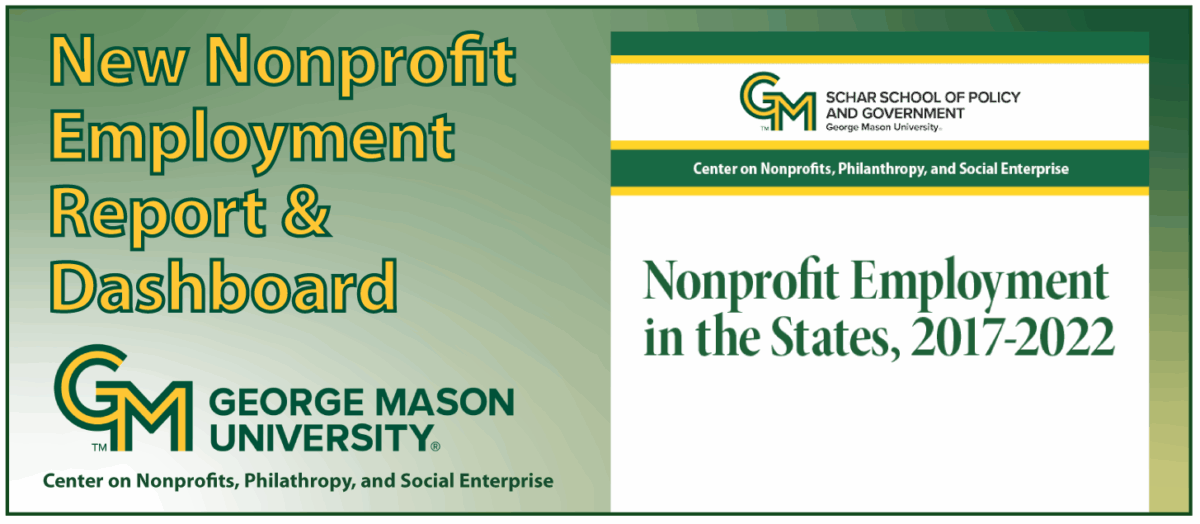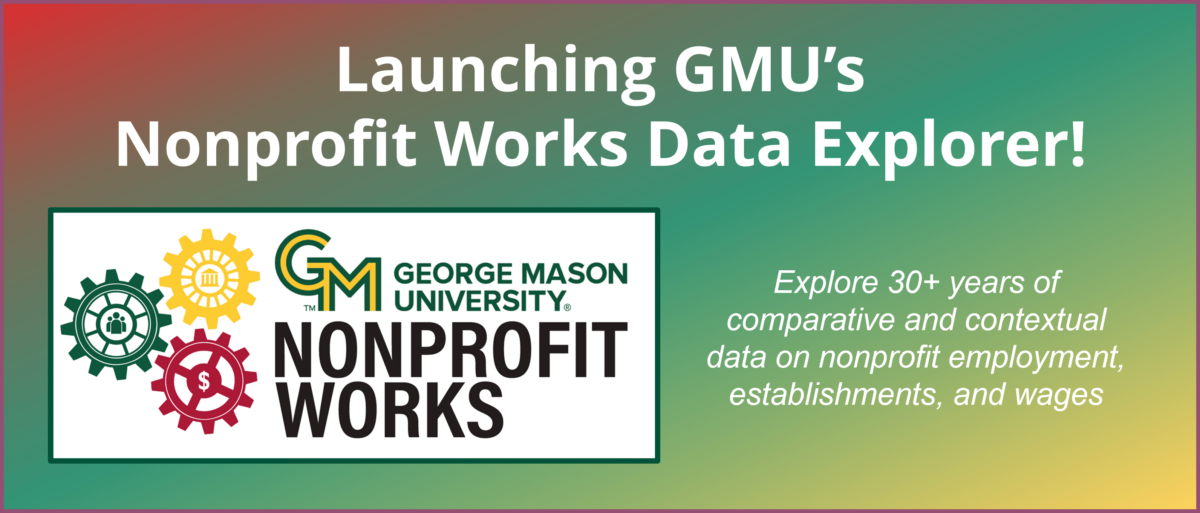The George Mason University – Nonprofit Employment Data (GMU-NED) Project generates new information on economic trends in the nonprofit sector and produces cutting-edge reports on key components of the nonprofit economy in regions and states across the country. These reports demonstrate the significant economic scale and importance of the nonprofit sector on the national, state, and regional levels. To produce these reports, the GMU-NED Project utilizes a novel methodology developed by researchers at Johns Hopkins University to draw on a previously untapped source of data to document the size, composition, distribution, and growth of nonprofit employment and wages. During the height of the COVID-19 pandemic, the Johns Hopkins University – Nonprofit Employment Data (JHU-NED) Project highlighted the impact of the COVID-19 pandemic on the nonprofit sector. This work provided a unique resource, which in turn, led to a number of important policy changes that better supported the sector’s recovery.
In 2022, the Center on Nonprofits, Philanthropy, and Social Enterprise in the Schar School of Policy and Government at George Mason University was pleased to continue the crucial work of the JHU-NED Project following the passing of Dr. Lester Salamon. The center is able to do so through the generous support of the Charles Stewart Mott Foundation. The GMU-NED Project will be led by Center Director Dr. Alan Abramson, in collaboration with his Center faculty colleagues Dr. Stefan Toepler and Dr. Mirae Kim.
Learn more about this project!

COMING SOON: Learn more about the GMU-NED’s advocacy and coalition building efforts.
Description
Advocacy & Coalition Building
News & Updates
-
Nonprofit Employment in the States, 2017-2022

The Center on Nonprofits, Philanthropy, and Social Enterprise in George Mason University’s Schar School of Policy and Government is pleased to announce the release ofRead More »
-
Announcing the Launch of George Mason University’s Nonprofit Works Data Explorer!

Explore 30+ years of comparative and contextual data on nonprofit employment, establishments, and wages We are happy to announce the launch of the new NonprofitRead More »
Join Our Mailing List!
Sign up for information about the Center on Nonprofits, Philanthropy, and Social Enterprise at George Mason University.
History of the NED Project
The Johns Hopkins University – Nonprofit Economic Data (JHU-NED) Project at the Johns Hopkins Center for Civil Society Studies (JHU/CCSS), began in 1999. Led by Dr. Lester M. Salamon in collaboration with his colleagues S. Wojciech Sokolowski, Stephanie Lessans Geller, and Chelsea Newhouse, the JHU-NED Project surfaced and tapped a crucial new source of data on nonprofit employment and wages embedded in the Bureau of Labor Statistics’ (BLS) Quarterly Census of Employment and Wages (QCEW). The data from the QCEW are unique in that they are systematically collected for all sectors of the economy, making data on nonprofits directly comparable to data on for-profits and government employers. These data revealed that, as of 2017, the nonprofit sector employed more than 1 in every 10 non-government workers in the US—more than all branches of the manufacturing industry combined and behind only retail trade and accommodation and food services. The JHU-NED team’s work to track how nonprofit employment changed over time and how nonprofits compared to their for-profit counterparts in key fields including health care, education, social services, and the arts changed the understanding of the importance of these critical institutions. More recently, their work during the COVID-19 pandemic to highlight the impact of the crisis on these institutions provided a unique resource, which in turn, helped lead to a number of important policy changes that supported nonprofit recovery.
With the closing of JHU/CCSS after the passing of Lester Salamon, our Center on Nonprofits, Philanthropy, and Social Enterprise at George Mason University is pleased to be given the opportunity to carry this work forward, and Center staff are grateful to the Charles Stewart Mott Foundation for their support of this effort. The GMU-NED Project will not only continue the work of the JHU-NED project, but will build on it, bringing the unique expertise of the GMU Center’s faculty and staff to bear to broaden and enhance the available data on nonprofit employment, wages, and economic impact in the US.
What will stay the same
Cutting-edge reports. The GMU-NED Project will continue to produce cutting-edge reports on nonprofit establishments, employment, and wages based on available BLS QCEW data. GMU has engaged former JHU-NED project manager Chelsea Newhouse, now a Senior Program Manager at the East-West Management Institute, to lead the production of these reports—which will ensure consistency and comparability between previous and new research.
Nonprofit Works. The GMU Nonprofit Works Data Explorer, which was previously hosted at Johns Hopkins University, was fully re-developed and launched in February 2025. The GMU-Nonprofit Works Data Explorer allows users to easily search and download the latest available data on nonprofit employment, establishments, and weekly and annual average wages on the national, state, county, and MSA levels by field and compare nonprofits to for-profits and government over the full period. Data are currently available at the state and county level for the years 1990-2022. National data are available beginning in 2007, and MSA data are available beginning in 2013. The GMU Nonprofit Works Data Explorer is accessible at https://gmu-nonprofit-works.org/.
Data advocacy. We will also continue to work with our colleagues at Independent Sector, the Aspen Institute, the National Council of Nonprofits, and other organizations to seek more frequent releases of nonprofit employment data by BLS. The ultimate goal is to have BLS report on nonprofit employment more frequently than every five years, which is the current reporting cycle.
What we will add
Broadening the nonprofit data landscape. We will look to tap our team’s expertise in a broad range of federal data systems to enhance and expand the pool of available data on nonprofit employment, wages, and impact. Tapping into these additional data sources will allow for a more robust understanding of the nonprofit sector’s economic role, the demographics of the nonprofit workforce, and federal funding of nonprofit organizations.
In some cases, these data aren’t being fully used by those interested in the nonprofit sector because sector leaders and researchers are simply unfamiliar with the data sources. In other cases, information on nonprofits in the data sources is incomplete, inaccurate, or not fully identified, and adjustments or corrections are needed before the data can be used with confidence. But, while obstacles to using federal data sources for nonprofit purposes exist, there is great potential in making greater use of these sources. To advance this work, the project will identify several of the major federal data systems that have the potential to be more useful to nonprofit stakeholders and seek to convene relevant stakeholders—such as federal data staff, nonprofit researchers, and nonprofit leaders—to develop plans for overcoming the obstacles preventing better use of these federal data. For example, with one data source, Bureau of Economic Analysis data on nonprofits as a share of the overall U.S. economy, a first step would be to convene government and university-based researchers to better understand the strengths and limitations of the current data and how the data can appropriately be used to inform the work of nonprofit leaders. This initiative will follow up work begun by Alan Abramson during his year as a visiting scholar at Independent Sector on developing a state of the nonprofit sector report.
Synergies with sector data projects. The GMU-NED Project is well positioned to explore synergies with other on-going efforts to make data on the nonprofit sector more readily accessible. Specifically, we will explore the possibility of folding the BLS and other federal databases on nonprofits into an on-going effort to develop a platform that can become a warehouse of various datasets on the nonprofit sector under the “Developing a Data Platform for Analysis of Nonprofit Organizations” project, funded by the National Science Foundation. GMU-NED Director Alan Abramson and Dr. Mirae Kim, who have been involved in this effort, will lead the discussion around integrating BLS and other federal data into the platform.
Building networks for nonprofit data. The GMU-NED Project will also explore with other stakeholders creating and hosting a network for federal officials who work with databases containing useful nonprofit data. We believe convening these officials on a regular basis would be of significant benefit for the nonprofit sector by highlighting the importance of nonprofit data for federal data experts, creating opportunities for collaboration, and expanding the pool of experts who can support nonprofit data generation, publication, and analysis within federal data systems.
Our team at George Mason University is excited to partner with the Mott Foundation and the East-West Management Institute to carry the important work of the JHU-NED project forward, to expand the available data on the nonprofit sector, and to ensure that this vital information remains available to sector stakeholders.
About the data
The major innovation of the JHU-NED Project was the development of a novel methodology to draw on a previously untapped source of data to document the size, composition, distribution, and growth of nonprofit employment and wages. In the process, the JHU-NED Project demonstrated the significant economic scale and importance of the sector on the national, state, and regional levels. The GMU-NED project will continue this work to tap this data source—i.e., the Quarterly Census of Employment and Wages (QCEW), or ES-202, data program operated by state Labor Market Information (LMI) offices in cooperation with the U.S. Bureau of Labor Statistics (BLS). This system has several advantages over other data sources commonly used to examine nonprofit employment, including:
- The underlying data are collected quarterly and cover employment, wages, and establishments for virtually all workplaces in this country, including nonprofit workplaces;
- The QCEW covers both public and private workplaces in the same data system, thus making it possible to compare employment and wages across the nonprofit, for-profit, and government sectors over time and to analyze the changing patterns of nonprofit and for-profit competition;
- QCEW data are collected at the level of individual facilities or “establishments” rather than organizations, which provides a more accurate picture of the distribution of employment across a region since many organizations operate multiple facilities located in different locales.
Despite its advantages, the QCEW data were historically unavailable to yield information on the nonprofit sector because BLS lacked both the means and the incentive to separate out the nonprofit employers in their data. However, working with state LMI officials, state nonprofit associations, and the BLS, the JHU-NED Project developed a methodology for tapping into the QCEW data source and extracting data on nonprofit places of employment, unlocking a treasure trove of information on the scope, structure, and changing fortunes of the nonprofit sector in states and regions throughout the country. This methodology has been further refined by BLS researchers, resulting in the most comprehensive data available on nonprofit employment and wages by field of activity in the US down to the county level.



